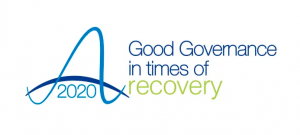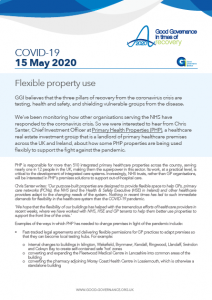Flexible property use
15 May 2020

GGI believes that the three pillars of recovery from the coronavirus crisis are testing, health and safety, and shielding vulnerable groups from the disease.
We’ve been monitoring how other organisations serving the NHS have responded to the coronavirus crisis. So we were interested to hear from Chris Santer, Chief Investment Officer at Primary Health Properties (PHP), a healthcare real estate investment group that is a landlord of primary healthcare premises across the UK and Ireland, about how some PHP properties are being used flexibly to support the fight against the pandemic.
PHP is responsible for more than 510 integrated primary healthcare properties across the country, serving nearly one in 12 people in the UK, making them the superpower in this sector. Its work, at a practical level, is critical to the development of integrated care systems. Increasingly, NHS trusts, rather than GP organisations, will be interested in PHP’s premises solutions to support out-of-hospital care.
Chris Santer writes: ‘Our purpose-built properties are designed to provide flexible space to help GPs, primary care networks (PCNs), the NHS (and the Health & Safety Executive (HSE) in Ireland) and other healthcare providers adapt to the changing needs of the system. Nothing in recent times has led to such immediate demands for flexibility in the healthcare system than the COVID-19 pandemic.
‘We hope that the flexibility of our buildings has helped with the tremendous efforts of healthcare providers in recent weeks, where we have worked with NHS, HSE and GP tenants to help them better use properties to support the front line of the crisis.’
Examples of the ways in which PHP has needed to change premises in light of the pandemic include:
- Fast-tracked legal agreements and delivering flexible permissions for GP practices to adapt premises so that they can become local testing hubs. For example:
- internal changes to buildings in Islington, Wakefield, Brynmawr, Kendall, Ringwood, Llandaff, Swindon and Colwyn Bay to create self-contained safe ‘hot’ zones
- converting and expanding the Fleetwood Medical Centre in Lancashire into common areas of the building
- converting the pharmacy adjoining Moray Coast Health Centre in Lossiemouth, which is otherwise a standalone building
- Fast-tracked legal agreements and flexible permissions for GP practices to adapt car parks and erect temporary buildings to triage people with suspected cases of COVID-19. For example:
- Devonport Medical Centre, Dorset, where a marquee was erected over three car park bays in front of the premises to provide a drive-through testing facility. Showers and toilet facilities were also provided and the building itself re-organized to create a ‘hot’ area within the centre.
- Wooler Medical Centre, Northumberland and Thingwall Medical Centre in The Wirral, where portable and modular buildings were set up in the building car parks.
- Fast-tracked and flexible permissions for rapid installation of enhanced broadband at a number of primary health properties.
These solutions to support out-of-hospital services will have obvious parallel appeal to NHS trusts in both community (and even hospital-based) premises.
PHP has also, as part of the immediate national call to arms, provided lists of:
- vacant spaces at 32 properties in their portfolio to NHS England, NHS Scotland, and NHS Wales, offering the space throughout the crisis – this includes CCGs that have seen some of the largest number of coronavirus outbreaks, such as Brent, North Cumbria, and Essex
- all large properties that are occupied but under-utilised and could be used with agreement from the tenant (often NHS Property Services) – for example, a temporary maternity service accommodated at the Low Grange Medical Centre, South Tees Hospitals NHS Foundation Trust
Finally, PHP has put additional funding into a new primary care centre in Rialto, Dublin, to ensure early occupation by the HSE in Ireland in their fight against COVID-19. This approach would also work to accelerate making new premises available in the UK, as could extensions to existing property, subject to the availability of, and safe conditions for, the construction workforce.
Long-term flexibility
This flexibility for users will remain relevant in the longer term. We have all seen the rapid adoption of modern technology to deliver online consultations by GP practices during the pandemic. This appears to be working well, although as the healthcare needs of the population begin to normalise, the need for follow-up consultations has not disappeared. Indeed, recent estimates suggest a backlog of up to seven million deferred procedures as a result of the pandemic. NHS trusts, thinking imaginatively, could use primary care buildings to provide suitable locations from which to deliver a comprehensive vaccination programme in due course.
More fundamentally, the desire expressed in the NHS Long Term Plan for more integrated care for patients away from large, acute hospitals and closer to the community in a primary health setting remains unchanged. This includes dissolving the boundaries between hospitals, general practice and community care, something that has begun to happen during this exceptional period. However, in many situations, buildings are dated and not capable of supporting this aspiration. In 2017, Sir Robert Naylor concluded that the primary care estate required c. £5bn of investment to upgrade it for the 21st Century.
PHP is addressing this by working with commissioners, federations, PCNs and practices keen to deliver their enriched integrated vision for local services, and providing the real estate infrastructure fit for 21st Century healthcare.
Property investments pay off
PHP has invested £2.4bn in the primary care estate since its inception 24 years ago, including by refurbishing or reconfiguring existing buildings or via the delivery of new purpose-built buildings to meet the evolving needs of primary care.
As an example, PHP’s new property in Eastbourne will provide safe, modern, well-connected facilities for several merged GP practices to deliver primary care services to more than 28,000 patients. The property comprises an area of almost 2,000 square metres, to be fully let for 25 years to the merged practices, who will form a single PCN as a result. It will have 17 consulting rooms alongside dedicated clinician hot-desking space to optimise room use. Space efficiencies will allow the site to deliver the same capacity to host services with 25% less space than usually needed.
The practice itself will specialise in MSK services and outpatients, meaning less travel for the relatively aged local population. This also enables the PCN to provide a wider range of services in co-located teams and more of a one-stop-shop experience for patients. The building was also designed with environmental considerations at heart and is expected to achieve an excellent environmental rating.
East Sussex Healthcare NHS Trust is a trust with two main hospital sites where services have been rationalised across the towns of Hastings and Eastbourne, so PHP’s property in Eastbourne provides another potential property ‘chess piece’ to planners seeking to develop services equitably across their local patch.
Chris Santer concludes: ‘At PHP, we are proud to be working with our partners to deliver high quality buildings, and are keen to ensure that flexible and modern healthcare facilities are contributing to effective integrated care for communities throughout the UK and Ireland.’
GGI is currently engaging in a piece of research with PHP, as the main national company working in this sector’ to explore the future of primary care premises, commissioning patterns, and the influence of healthcare integration and digital access to primary care.
If you are interested in this topic and would like to discuss it, please contact GGI by calling us on 07732 681120 or emailing advice@good-governance.org.uk.

